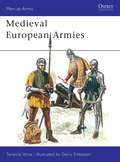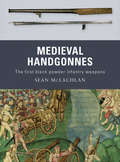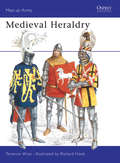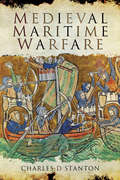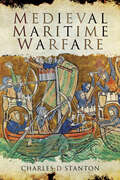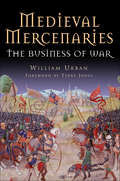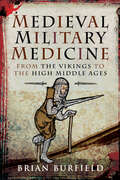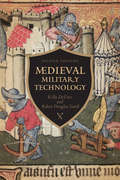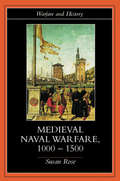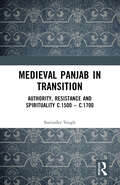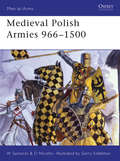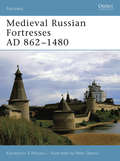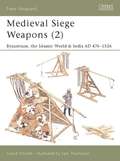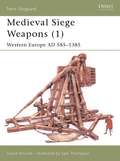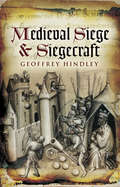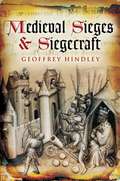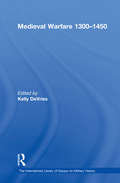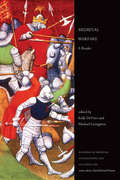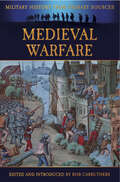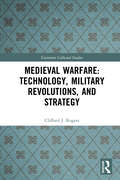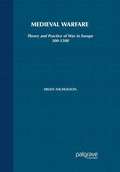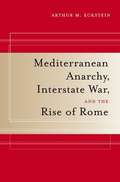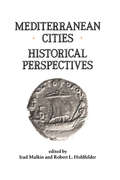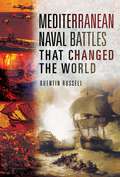- Table View
- List View
Medieval European Armies
by Terence Wise Gerry EmbletonAlmost continual warfare raged in Europe during the period 1300-1500. These wars were the furnaces in which many of the modern European nations were forged. Parallel with this emergence of the nations came the development of national armies to protect the newly-won borders and independence, yet throughout this period the old feudal method of raising an army persisted. This fascinating study by Terence Wise explores the organization, weapons and equipment of the armies who fought across Medieval Europe, from the Hundred Years' War (1337-1453) to the fight against the Moors in Spain, and the French invasion of Italy in 1494.
Medieval Handgonnes
by Sean Mclachlan Gerry EmbletonOsprey's new Weapon series provides a highly-detailed yet affordable overview of the development, use, and impact of small arms throughout history--from the sword to the machine gun. Journey back to the time when handguns had no moving parts! Variously called handgonnes, hackbuts, coulevrines, pistolas, schiopettos, tyufyaks, and even bombardelles, the first black powder infantry weapons were extremely crude by today's standards. In his new book, Sean McLachlan, author of American Civil War Guerilla Tactics, dispels the myth that these weapons were ineffective on the battlefield (beyond their terrifying noise!). Rather, he demonstrates through careful examination of the historical records that the handgonne was a viable weapon from its inception, even as it saw action side-by-side with the cross-bow.Readers will be treated to a lush collection of rare photographs and artwork from such far-flung locales as Danish National Museum and the Bayerisches Armeemuseum. Original artwork from Gerry and Sam Embleton illustrate how these weapons were used on the battlefield and reenactor photos demonstrate step-by-step how they were loaded and fired.
Medieval Heraldry
by Terence Wise Richard HookCoats of arms were at first used only by kings and princes, then by their great nobles, but by the mid-13th century arms were being used extensively by the lesser nobility, knights and those who later came to be styled gentlemen. In some countries the use of arms spread even to merchants, townspeople and the peasantry. From the mundane to the fantastic, from simple geometric patterns to elaborate mythological beasts, this fascinating work by Terence Wise explores the origins and appearance of medieval heraldic devices in an engagingly readable style accompanied by numerous illustrations including eight full page colour plates by Richard Hook.
Medieval Maritime Warfare
by Charles D. StantonThis sweeping history of maritime warfare through the Middle Ages ranges from the 8th century to the 14th, covering the Mediterranean and Northern Europe. After the fall of Rome, the sea becomes the center of conflict for Western Civilization. In a world of few roads and great disorder, it is where power is projected and wealth is sought. Yet, since this turbulent period in the history of maritime warfare has rarely been studied, it is little known and even less understood. In Medieval Maritime Warfare, Charles Stanton depicts the development of maritime warfare from the end of the Roman Empire to the dawn of the Renaissance, recounting the wars waged in the Mediterranean by the Byzantines, Ottomans, Normans, Crusaders, and the Italian maritime republics, as well as those fought in northern waters by the Vikings, English, French and the Hanseatic League. Weaving together details of medieval ship design and naval strategy with vivid depictions of seafaring culture, this pioneering study makes a significant contribution to maritime history.
Medieval Maritime Warfare
by Charles D. StantonThis sweeping history of maritime warfare through the Middle Ages ranges from the 8th century to the 14th, covering the Mediterranean and Northern Europe. After the fall of Rome, the sea becomes the center of conflict for Western Civilization. In a world of few roads and great disorder, it is where power is projected and wealth is sought. Yet, since this turbulent period in the history of maritime warfare has rarely been studied, it is little known and even less understood. In Medieval Maritime Warfare, Charles Stanton depicts the development of maritime warfare from the end of the Roman Empire to the dawn of the Renaissance, recounting the wars waged in the Mediterranean by the Byzantines, Ottomans, Normans, Crusaders, and the Italian maritime republics, as well as those fought in northern waters by the Vikings, English, French and the Hanseatic League. Weaving together details of medieval ship design and naval strategy with vivid depictions of seafaring culture, this pioneering study makes a significant contribution to maritime history.
Medieval Mercenaries: The Business of War
by William UrbanThe Middle Ages were a turbulent and violent time, when the fate of nations was most often decided on the battlefield, and strength of arms was key to acquiring and maintaining power. Feudal oaths and local militias were more often than not incapable of providing the skilled and disciplined warriors necessary to keep the enemy at bay. It was the mercenary who stepped in to fill the ranks. A mercenary was a professional soldier who took employment with no concern for the morals or cause of the paymaster. But within these confines we discover a surprising array of men, from the lowest-born foot soldier to the wealthiest aristocrat the occasional clergyman, even. What united them all was a willingness, and often the desire, to fight for their supper.In this benchmark work, William Urban explores the vital importance of the mercenary to the medieval power-broker, from the Byzantine Varangian Guard to fifteenth-century soldiers of fortune in the Baltic. Through contemporary chronicles and the most up-to-date scholarship, he presents an in-depth portrait of the mercenary across the Middle Ages.
Medieval Military Medicine: From the Vikings to the High Middle Ages
by Brian BurfieldA study of how doctors and surgeons treated the brutal injuries and illnesses suffered by medieval combatants. Soldiers of the Middle Ages faced razor-sharp swords and axes that could slice through flesh with gruesome ease, while spears and arrows were made to puncture both armor and the wearer, and even more sinister means of causing harm produced burns and crush injuries. These casualties of war during the 500-year period between the ninth and thirteenth centuries in Northern and Western Europe are the focus of Brian Burfield&’s study, but they represent just a portion of the story—disease, disability, disfigurement, and damaged minds all played their roles in this awful reality. Surgical methods are described in the book, as are the fixes for fractured skulls, broken bones, and damaged teeth. Disfiguring scars and disabling injuries are examined alongside the contemporary attitudes toward them. Also investigated are illnesses like dysentery and St. Anthony&’s Fire, plus infected wounds which were often deadlier than the weapons of the age. A final chapter on the psychological trauma caused by war is included and contains a significant focus on the world of the Vikings. Burfield&’s account features many individual cases, extracting their stories of wounds, sickness, and death from chronicles, miracle collections, surgeries, government records, and other documents. The prose, poetry, and literature of the period are also of great value in bringing these cases to life, as is the evidence provided by modern archaeological and historical scholarship.
Medieval Military Technology, Second Edition
by Kelly Robert DeVries Robert Douglas SmithFirst published in 1992, Medieval Military Technology has become the definitive book in its field, garnering much praise and a large readership. This thorough update of a classic book, regarded as both an excellent overview and an important piece of scholarship, includes fully revised content, new sections on the use of horses, handguns, incendiary weapons, and siege engines, and eighteen new illustrations. The four key organizing sections of the book still remain: arms and armor, artillery, fortifications, and warships. Throughout, the authors connect these technologies to broader themes and developments in medieval society as well as to current scholarly and curatorial controversies.
Medieval Naval Warfare 1000-1500 (Warfare And History Ser.)
by Susan RoseHow were medieval navies organised, and how did powerful rulers use them? Medieval Naval Warfare, 1000-1500 provides a wealth of information about the strategy and tactics of these early fleets and the extent to which the possibilities of sea power were understood and exploited. This fascinating account brings vividly to life the dangers and diffic
Medieval Panjab in Transition: Authority, Resistance and Spirituality c.1500 – c.1700
by Surinder SinghThis book reconstructs the historical transition in the undivided Panjab during the sixteenth and seventeenth centuries. It shows that the assertion of Mughal and Afghan suzerainty faced sustained resistance from local elements, particularly the autonomous tribes and hill chiefdoms. In central plains, Dulla Bhatti mobilized the toilers of his ancestral domain and, leading a relentless fight against the Mughal oppression, became an abiding symbol of resistance in the collective memory. The multicultural legacy of Panjab evolved through diverse strands of spirituality. The jogis, wedded to monastic discipline, supernatural abilities and land grants, gained acceptance through their exertions for social betterment. The Sabiri and Qadiri silsilas channelized mystical urges towards the technique of prime recitation. The popular verses of Shah Husain, Baba Lal and Sultan Bahu proposed a loving relation with God. The legendary lovers, perishing in the struggles against patriarchal forces, promoted a merger of dissent with spirituality. In the city of Lahore, the material pursuits and cultural life were visible in a mosaic of descriptions, including episodes of social tension. The book understands the upliftment of depressed castes as a defining feature of Sikhism. It places egalitarian concern of the Sikh Gurus alongside the anti-caste protests of Namdev, Kabir and Ravidas. Owing to scriptural authority and congregational equality, the members of depressed castes attained a numerical majority in the Sikh warrior bands that shook the foundations of the Mughal state. The work relies on evidence from the Persian chronicles, Mughal newsletters, Sufi writings, Sikh literature and Punjabi folklore. Please note: Taylor & Francis does not sell or distribute the Hardback in India, Pakistan, Nepal, Bhutan, Bangladesh and Sri Lanka.
Medieval Polish Armies 966-1500
by David Nicolle Gerry EmbletonThe history of Poland is a fascinating study of a people struggling to achieve nationhood in the face of internal and external enemies. Poland became a unified Christian state in AD 966 and by the 12th century a knightly class had emerged - a force that was integral to the defense of Poland against increasingly frequent foreign invasions. Intent on crushing rival Christian states, the Templars, Hospitallers and Teutonic Knights all mounted attacks but were beaten back by the Poles, as were invading Mongols and Turks. This book reveals the organization, equipment and battle histories of the medieval Polish armies as they developed and modernized to emerge as one of the dominant powers of Eastern Europe.
Medieval Russian Fortresses AD 862-1480
by Peter Dennis Konstantin NossovUsing archaeological evidence and first-hand sources, Konstantin Nossov charts the history of the medieval Russian fortress from its early beginnings until the 14th century.According to Russian legend, in AD 862, the Slav tribes of what is now European Russia invited a number of Scandinavian princes to rule over them. In AD 882, Prince Oleg united these kingdoms as the feudal state of Kievan Rus, by building a series of settlement and border fortifications, including the Zmievy Valy (Snake Ramparts), to protect against foreign invasion.The rise of feudalism through the 11th century saw the development of individual fortified sites to the detriment of the extended border defenses. Consequently, Mongol hordes poured over the border, introducing the siege warfare techniques of the East, and heavily influencing the fortification styles thereafter.The rise of Muscovy in the fourteenth century saw an enhanced role for Moscow and the Kremlin, which was rebuilt in stone reflecting its increased significance.This book brings all these diverse strands together into a comprehensive volume on the fortifications of Russia from the early days of the Kievan Rus' until the foundation of the modern state in 1480.
Medieval Siege Weapons: Byzantium, the Islamic World & India AD 476-1526
by David NicolleDuring medieval era, the pre-existing military-technological traditions from the ancient worlds were brought together. Three civilizations were primarily responsible for this evolution: the Late-Roman or Byzantine Empire, the Islamic World, and latterly the Mongol 'World Empire'. This book examines the resulting stone-throwing machines from torsion 'energy storage' systems, to manpowered and counterbalance sling devices, rockets and others.
Medieval Siege Weapons: Western Europe AD 585-1385
by David NicolleThis text explores a range of devices and details the changes in medieval siege warfare brought about by the mixing of traditions from Greece, Rome, Persia, India and China.
Medieval Siege and Siegecraft
by Geoffrey HindleyGreat sieges changed the course of medieval history, yet siege warfare, the dominant military activity of the period, is rarely given the attention it deserves. Geoffrey Hindley's highly readable new account of this vital but neglected aspect of medieval warfare looks at the subject from every angle. He traces the development of fortifications and siege equipment, explores the psychological dimension and considers the parts played by women and camp followers. He also shows siege tactics in action through a selection of vivid case studies of famous sieges taken from the history of medieval Europe and the Holy Land. His stimulating and accessible study will be fascinating reading for medieval specialists and for anyone who is interested in the history of warfare.
Medieval Sieges & Siegecraft
by Geoffrey HindleyHere Geoffrey Hindley serves us the history of military sieges from every angle, tracing the development of fortifications and equipment (offensive and defensive), penning vivid portraits of the weapons involved, exploring the psychology of laying siege, and even describing the role played by women and camp followers in battle. He shows siege tactics in action through real-life case studies of famous sieges that changed the course of history in medieval Europe and the Holy Land. His stimulating and accessible study will be fascinating reading for medieval specialists and for anyone who is interested in the history of warfare.
Medieval Warfare 1300–1450 (The International Library of Essays on Military History)
by Kelly DeVriesWar was epidemic in the late Middle Ages. It affected every land and all peoples from Scotland and Scandinavia in the north to the southern Mediterranean Sea coastlines of Morocco, North Africa, Egypt, and the Middle East in the south, from Ireland and Spain in the west to Russia and Turkey in the east. Nowhere was peaceful for any significant amount of time. The period also saw significant changes in military theory and practice which altered the ways in which campaigns were conducted, battles fought, and sieges laid; and changes in the leadership, recruitment, training, supply and financing of armies. There were changes in the relationship between those waging warfare, from generals to irregular troops, and the society in which they lived and for or against which they fought; the frequency of popular rebellions and the participation in them by townspeople and peasants; changes in the desire to undertake Crusades, and changes in technology, including but not limited to gunpowder weapons. This collection gathers together some of the best published work on these topics. The first section of seven papers show that throughout Europe in the later Middle Ages generals led and armies followed what are usually defined as "modern" strategy and tactics, contrary to popular belief. The second part reprints nine works that examine the often neglected aspects of the process of putting and keeping together a late medieval army. In the third section the authors discuss various ways that warfare in the fourteenth and fifteenth century affected the society of that period. The final sections cover popular rebellions and crusading.
Medieval Warfare: A Reader (Readings in Medieval Civilizations and Cultures)
by editors Kelly DeVries Michael LivingstonMedieval Warfare: A Reader examines how armed conflict was experienced in the Middle Ages both on the field of battle and at home. This comprehensive collection of more than 130 primary-source materials—some translated here for the first time—traces over one thousand years of military developments, including the fall of Rome, the fight for Jerusalem, the building of castles and other fortifications, the rise of gunpowder, and the negotiation of treaties. Developed by two of the leading experts in medieval military history, the readings tell stories of terrors and tragedies, triumphs and technologies in the Middle Ages. By reclaiming the voices of victims and veterans that have previously been ignored, the editors stake out a powerful new perspective on the long history of military conflict and suffering.
Medieval Warfare: Medieval Warfare (Military History from Primary Sources)
by Bob CarruthersJames Grant (1822–1887) was a Scottish author and was born in Edinburgh, Scotland, and was a distant relation of Sir WalterScott. He was a prolific author, writing some 90 books, including many yellow-backs. Titles included Adventures of an Aide-decamp, One of 'The Six Hundred', The Scottish Musketeers and The Scottish Cavalier.Medieval Warfare collects Grant's work on the subject, from the Battle of Hastings in 1066 to the Battle of Barnet in 1471, a decisive engagement in the Wars of the Roses. The book contains remarkably detailed accounts of many key battles from the period including the Battle of the Standard and Bannockburn to Poitiers and Agincourt from the Hundred Years' War. The historically defining strategies employed during these battles are explored throughout.Illustrated with vivid portraits of battle and detailed drawings of the tools and weapons of the period, this is the definitive account of a trying and bloody period in history.
Medieval Warfare: Technology, Military Revolutions, and Strategy (Variorum Collected Studies)
by Clifford J. RogersThis volume explores the topics of military revolutions, strategy, and tactics both separately and as they relate to each other. It makes important contributions to understanding European warfare in the Early, High, and especially the Late Middle Ages, as well the military transition to the Early Modern Period.Readers will find detailed analysis of how technological and non-technological developments interacted to effect major changes in how wars were fought across the period. The evolution and capabilities of the English longbow and of early gunpowder artillery are examined in depth. Changes in the tools of war naturally affected plans to employ those tools to achieve political ends – military strategy – but strategy was never dictated by technology. That point is illustrated by examinations of English efforts to conquer Wales; the Anglo-Burgundian alliance of the late Hundred Years War; and the economic factors shaping medieval conquests in general.The nine studies in the volume have all been published previously, but a new introduction shows how they fit together, particularly explaining how they collectively rebut common critiques of Rogers’s controversial thesis that European warfare was reshaped by the Infantry and Artillery Revolutions during the era of the Hundred Years War. Two of the chapters have been substantially expanded, so that the versions printed here should be the ones consulted and cited in the future by scholars of medieval warfare and military revolutions.
Medieval Warfare: Theory and Practice of War in Europe 300–1500
by Helen NicholsonWarfare in medieval times was never static or predictable - although there were ideals and conventions to follow, in the field commanders had to use their initiative and adapt to the needs of the moment. In this concise, wide-ranging study, Helen Nicholson provides the essential introductory guide to a fascinating subject. Medieval Warfare - surveys and summarises current debates and modern research into warfare throughout the whole of the medieval period across Europe - sets medieval warfare theory and practice firmly into context as a continuation and adaptation of practice under the Roman Empire, tracing its change and development across more than a millennium - considers military personnel, buildings and equipment, as well as the practice of warfare by land and sea
Meditations in Green (Vintage Contemporaries Ser.)
by Stephen WrightOne of the greatest Vietnam War novels ever written, by an award-winning writer who experienced it firsthand.Deployed to Vietnam with the U.S. Army's 1069 Intelligence Group, Spec. 4 James Griffin starts out clear-eyed and hardworking, believing he can glide through the war unharmed. But the kaleidoscope of horrors he experiences gets inside him relentlessly. He gradually collapses and ends up unstrung, in step with the exploding hell around him and waiting for the cataclysm that will bring him home, dead or not.Griffin survives, but back in the U.S. his battles intensify. Beset by addiction, he takes up meditating on household plants and attempts to adjust to civilian life and beat back the insanity that threatens to overwhelm him. Meditations in Green is a haunting exploration of the harrowing costs of war and yet-unhealed wounds, "the impact of an experience so devastating that words can hardly contain it" (Walter Kendrick, the New York Times Book Review). Through passages gorgeous, agonizing, and surreal, Stephen Wright paints a searing portrait of a nation driven to the brink by violence and deceit.
Mediterranean Anarchy, Interstate War, and the Rise of Rome
by Arthur M. EcksteinThis ground-breaking study is the first to employ modern international relations theory to place Roman militarism and expansion of power within the broader Mediterranean context of interstate anarchy. Arthur M. Eckstein challenges claims that Rome was an exceptionally warlike and aggressive state--not merely in modern but in ancient terms--by arguing that intense militarism and aggressiveness were common among all Mediterranean polities from circa 750 B.C. onwards. In his wide-ranging and masterful narrative, Eckstein explains that international politics in the ancient Mediterranean world was, in political science terms, a multipolar anarchy: international law was minimal, and states struggled desperately for power and survival by means of warfare. Eventually, one state, the Republic of Rome, managed to create predominance and a sort of peace. Rome was certainly a militarized and aggressive state, but it was successful not because it was exceptional in its ruthlessness, Eckstein convincingly argues; rather, it was successful because of its exceptional ability to manage a large network of foreign allies, and to assimilate numerous foreigners within the polity itself. This book shows how these characteristics, in turn, gave Rome incomparably large resources for the grim struggle of states fostered by the Mediterranean anarchy--and hence they were key to Rome's unprecedented success.
Mediterranean Cities: Historical Perspectives
by Robert L. Hohlfelder Irad MalkinFirst published in 1988. Routledge is an imprint of Taylor & Francis, an informa company.
Mediterranean Naval Battles That Changed the World
by Quentin RussellThis epic naval history examines seven pivotal Mediterranean conflicts, from the Battle of Salamis in the fifth century BC to the Siege of Malta during WWII. This book tells the story of the Mediterranean as a theater of war at sea. Historian Quentin Russell covers seven major battles or campaigns, each of which changed the balance of power and shape the course of history. Chronicling each battle in vivid detail, Russell also provides essential background, covering the history of naval power in the Mediterranean and the effect of the development of naval architecture and design on the outcomes. Readers will learn that the Battle of Lepanto in 1571 was the last major battle fought between galleys; the Battle of Navarino in 1827 was the last to be fought entirely by sailing ships; and the Battle of Cape Matapan in 1941—where a young Duke of Edinburgh saw action—was the first operation to exploit the breaking of the Italian naval Enigma codes. The battles included are: Salamis (480 BC), Actium (31 BC), Lepanto (1571), the Nile (aka Aboukir Bay, 1798), Navarino (1827), Cape Matapan (1941), and the Siege of Malta (1940-42).
